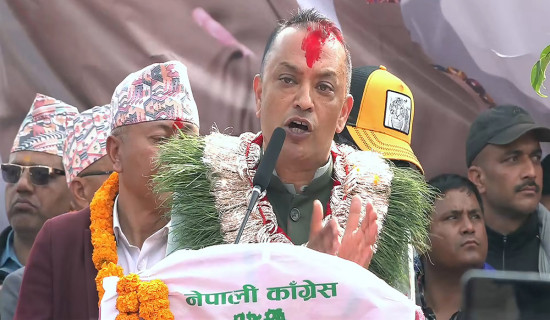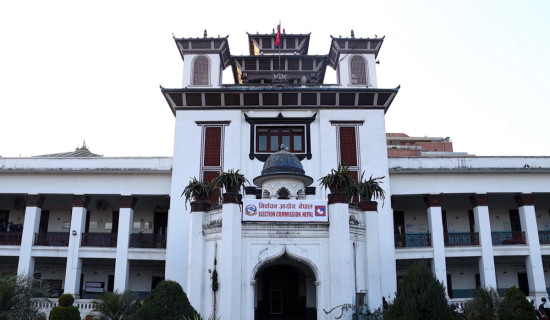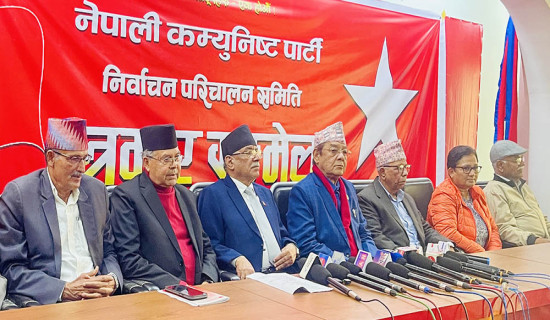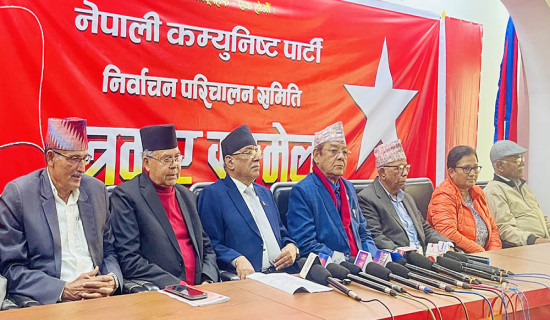- Thursday, 26 February 2026
Migratory birds flock Dhangadhi’s wetlands
By Avinash Chaudhary
Dhangadhi, Nov. 9: Birds from Siberia, Mongolia and Russia have arrived in Nepal's wetlands to escape the extreme cold in their native regions.
Various species of water birds have come to the wetlands in Kailali and Kanchanpur districts. Due to heavy snowfall in their native habitats, these migratory birds face challenges in finding food and shelter, prompting them to migrate here to escape the harsh winter back home.
The Ghodaghodi Lake in Kailali’s Ghodaghodi Bird Sanctuary, as well as the lower Karnali River region and Puraini Lake in Kanchanpur, are some of the wetlands that have seen an influx of migratory birds.
Ornithologist Hiru Lal Dangoura said that migratory birds have arrived at various wetlands, including Ghodaghodi Lake in the Ghodaghodi Bird Sanctuary in Kailali, the lower Karnali river basin and Puraini Lake in Kanchanpur. These birds migrate from regions like Siberia, Mongolia and Russia, where the cold is harsher than in Nepal, seeking a milder winter habitat.
According to him, migratory birds such as Ferruginous duck, mallard, Tufted duck, Garganey, Northern pintail and other various species of ducks have already arrived at Nepal's wetlands. The activity of these migratory birds has increased in lakes and rivers.
“As the temperatures started dropping there, many migratory birds arrived in our wetland areas as early as October,” said Dangoura. “These birds are likely to stay here for about six to seven months.”
The arrival of migratory birds has brought new vibrancy to the wetlands. The sounds of various bird species have resonated the rivers, lakes and ponds. These birds typically return to their native habitats around March or April. Each winter, a census of migratory water birds is conducted to monitor their presence.
Despite the annual arrival of migratory water birds in Nepal’s various wetlands, ornithologists reported a declining trend in their numbers.
D.R. Chaudhary, chairman of the Bird Conservation Network in Kailali, said that even at Ghodaghodi wetland, a Ramsar site of international importance, fewer migratory water birds are arriving compared to previous years.
Chaudhary pointed out this decline to the degradation of bird habitats, changes in the wetland ecosystem and reduced food availability. He said that, although conservation efforts have been made, the lack of proper management has led to a decrease in bird numbers.
“Conservation efforts have taken place in Ghodaghodi, but there has been a lack of proper management. Weeds and grasses have grown, leaving no space for birds to roost, enjoy or search for food,” said Chaudhary.
The Ghodaghodi Lake has been covered with lotus plants. Additionally, invasive species such as Ipomoea carnea (Besarm) have spread on the northern side of the lake.
Chaudhary believed that the excessive growth of weeds and plants within the lake has led to a decrease in oxygen levels. He pointed out that there is no longer an appropriate space for migratory birds, which typically enjoy open water environments for feeding and roosting.
“The habitat for birds is no longer as good as it used to be. The wetland has changed and as a result, the number of migratory birds has decreased,” said Chaudhary.
Ornithologists suggested that for better habitat management, weeds in the central area of Ghodaghodi Lake should be removed. It is also recommended that one part of the lake should be left as a grassy area and another part with shallow water for an optimal wetland environment.
“Some birds prefer grassy areas while others rely on shallow water for feeding and breeding. While certain species benefit from the grasses and weeds, other bird species are heavily impacted,” he added.




-square-thumb.jpg)







-original-thumb.jpg)

-original-thumb.jpg)